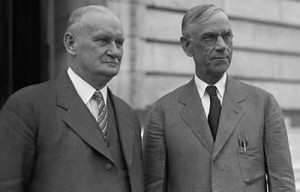Here’s a “shocker”: U.S. companies that operate overseas are keeping profits there and investing rather than repatriating the profits — because of punitive taxation. According to Frank Aquila at Bloomberg News, there may be as much as $1 trillion of U.S. profits overseas that are simply not being repatriated.
Why? Because it would mean a stiff tax on those businesses.
Recently, Congress severely limited the use of the Section 956 foreign income tax credit by U.S. companies that operate overseas as a part of a bill that included a $26.1 billion bailout to bankrupt states like New York and California. As a result, the U.S. is now simply missing out on foreign-generated capital flows back into the economy. This is a trend that will only grow worse unless the imbalance is restored.
U.S. companies are being incentivized to create jobs and expand operations overseas by our own punitive tax structure. This makes no sense. Through an anti-competitive tax environment, high labor costs, and inflated property values, the U.S. is driving investment and jobs into the arms of foreigners.
Aquila calls for a holiday on this tax, but why not eliminate it all together? Overseas companies are already taxed in the nations they do business in. The difference is that they are taxed at much lower rates than the U.S. where the corporate tax is 35 percent. Under the new law, companies cannot claim a tax credit for those overseas profits. So, they’re just not repatriating the profits.
This tax is literally killing capital flows back into the economy. If there’s really as much as $1 trillion in U.S. profits not being reinvested here, we’re committing economic suicide. If the tax were eliminated, the repatriated profits would more than make up for the trade deficit to China, which was $227 billion in 2009.
It is capital that could be used to create jobs here and increase the nation’s productive capacity. Foreign companies like Toyota have more of an incentive to build a factory in America than some U.S. companies do. Because Toyota is not taxed when it wants to invest in America. But an American company is — if its profits are coming from overseas.
What’s the sense of the nation exporting anything or expanding overseas if the profits are not reinvested here? China repatriates its earnings. Taxing foreign income is the equivalent of a business encouraging investors to put their money into competitors across the street.
So, while Congress and Treasury Secretary Timothy Geithner are busy obsessing over the Chinese yuan’s fixed exchange rate, perhaps they should instead turn their attention to the globally uncompetitive situation the U.S. economy is in.
The House recently passed legislation that would make “undervalued” currencies be considered by the Department of Commerce as a subsidy under World Trade Organization (WTO) rules. This will enable higher countervailing duties to be imposed on Chinese goods, making them more expensive for U.S. consumers to buy.
Of course, in principle there would be nothing to stop the Chinese’s own version of the Department of Commerce from defining the depreciating dollar as a subsidy under WTO rules, increasing the cost of U.S. goods overseas. Put another way, the U.S. can devalue its currency all it wants to boost exports — other nations are following suit, and the only impacts will not be on restoring the trade deficit or creating new jobs here, but on increasing inflation and the cost of living for average Americans.
Conversely, the U.S. could tell successful companies that operate abroad to repatriate their earnings here tax-free. And keep it that way. The only way to restore global imbalances is to create an attractive environment to move capital back into America and to produce things here.
The other part of that necessarily is to rein in regulatory burdens, high labor costs, land use restrictions, and environmental regulations that make it cost-prohibitive to invest here. If these constraints are not removed from the economy, the flight of capital overseas will continue. The U.S. needs to lower the cost of doing business here.
Congress limited the foreign income tax credit under the bogus justification that it would make U.S. multinational corporations pay their “fair share” of taxes. Instead, that money is staying overseas, creating jobs and investment there — as was predicted by critics. This is economic suicide. U.S. companies that operate overseas account for nearly half of all American exports, and employ 22 million Americans. Why is Congress encouraging them to shift more operations overseas?
Critical investment capital is being diverted abroad that could instead be devoted here at a time when the weak recovery is slowing down and unemployment remains high. The tax should be completely eliminated, and companies incentivized to use foreign profits to enhance the nation’s productive capacity: to build new factories here in the U.S., invest in research and development here, and create jobs here.
Once reinvested, the money will eventually be taxed anyway either through capital gains, income, and other taxes. So what’s the point of the foreign income tax? It really is the Reverse Smoot-Hawley Act, punishing U.S. exporters and other companies that operate overseas. Only, it’s the U.S. economy that is being punished through less investment and less jobs.
Bill Wilson is the President of Americans for Limited Government.







